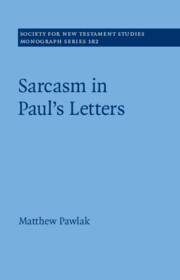Book contents
- Sarcasm in Paul’s Letters
- Society for New Testament Studies
- Sarcasm in Paul’s Letters
- Copyright page
- Dedication
- Contents
- Preface
- Abbreviations
- Acknowledgements
- Introduction
- Part I What Is Sarcasm? How Is Sarcasm Expressed? What Does Sarcasm Do?
- Part II Sarcasm in Paul’s Letters
- Book part
- Bibliography
- Index of Ancient Sources
- Index of Modern Authors
- Subject Index
Introduction
Published online by Cambridge University Press: 15 December 2022
- Sarcasm in Paul’s Letters
- Society for New Testament Studies
- Sarcasm in Paul’s Letters
- Copyright page
- Dedication
- Contents
- Preface
- Abbreviations
- Acknowledgements
- Introduction
- Part I What Is Sarcasm? How Is Sarcasm Expressed? What Does Sarcasm Do?
- Part II Sarcasm in Paul’s Letters
- Book part
- Bibliography
- Index of Ancient Sources
- Index of Modern Authors
- Subject Index
Summary
A few years back, I was sitting in Evensong at the Peterhouse Chapel in Cambridge. During the service, the first scripture reading was taken from the Book of Job, the 26th chapter, beginning at the second verse: ‘How you have helped one who has no power! How you have assisted the arm that has no strength! How you have counseled one who has no wisdom, and given much good advice!’ (Job 26:2–3 NRSV). This was read in a tone that conveyed all the grace and solemnity appropriate to the liturgical setting. The passage sounded as if Job was addressing pious thanksgiving unto God. I must confess to having repressed a chuckle with some difficulty, knowing that what sounded so sincere in this context was Job’s bitingly sarcastic indictment of his false comforters. While I do not fault a student reader for mistaking the tone of a passage for which they had no context, this situation well illustrates the exegetical importance of being able to accurately identify sarcasm. Simply put, taking a sarcastic utterance literally or reading a literal utterance sarcastically both have the potential to generate serious misreadings of a text.
- Type
- Chapter
- Information
- Sarcasm in Paul’s Letters , pp. 1 - 6Publisher: Cambridge University PressPrint publication year: 2022

